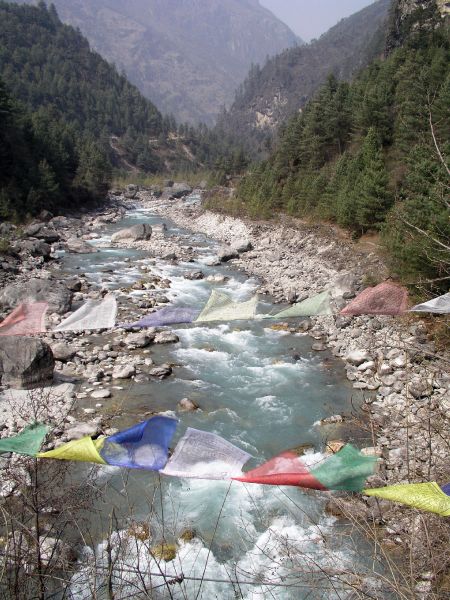Nepal 2009
From Lukla (9,383')
To Phakding (8,563')
4.35 Miles [Total - 4.35]

Saturday, March 14th
Our second attempt flying to Lukla came off much better than the day before. We landed safely, and adjourned to a nearby yard to sort baggage and partake refreshment. Our award-winning trip leader Tupten Yeshi Sherpa has over 20 years’ experience working with R.E.I. groups, and we immediately knew we were in good hands. His support team of guides, kitchen crew, porters, and livestock handlers numbered two dozen, and made us largely self-contained, carrying not only our camping gear, but also food both for ourselves and our animals. In short order we were organized and hiking out of Lukla with only a light day pack. Looking back this was our last view of a wheeled vehicle for the next twelve days.
At 2,840 meters elevation (9,318 feet to those of us who were having trouble making the conversion to metric), the air had only 70% of the oxygen we were used to at sea level. This fact became obvious with the first step we took, and we quickly realized vertical distances were going to be much more important than horizontal ones for the next ten days. Even the weight of the day pack seemed heavy. Our first evening would be spent at Phakding, only about six miles away, and, at least for day one, we would be going mostly downhill, as Phakding is about 750’ lower than the airport.
We stopped for lunch at the Wind Horse tea room, located right next to our walking path. (“Wind Horse” is the name given to the ubiquitous Buddhist prayer flags, which carry prayers to heaven on the breezes.) R.E.I. rents both the dining room and an empty shed for use as a kitchen at each meal. This provides total control over cleanliness that prevented any problem with food poisoning etc. on our trip. The system worked great: at higher elevation we experienced a drop in appetite, but no stomach issues.
After a leisurely lunch, we were back on the trail. Our kitchen crew stayed behind to wash dishes and pans, then packed up all their gear and sped up the trail, passing us in short order, and hurrying on to the next stop to have a meal waiting for us when we arrived. Even after ten days of acclimatizing on our part, these young boys continued to leave us in the dust after each meal. It was easy to become spoiled on this trip with this kind of attention.
Our route paralleled the course of the Dudh Koshi, or “Milk River,” given its name from the water’s milk-like color derived from the glacial till runoff. I had looked forward to seeing rickety swinging bridges like those in old guidebook photos, but all we passed were new and sturdy and steel. We crossed the Dudh on one such bridge for our first night’s stopping point at Phakding. Our gear had passed us an hour or so earlier on the backs of several ill-tempered dzopkio’s. The dzopkio is a cross between a yak and a cow, bred to deal with warm temperatures at lower elevations that a yak cannot handle. Our guides were always careful to keep us off to the side when a dzopkio passed as they were not afraid to use their sharp horns.
On arriving at the hotel/ tea room, we found tents already assembled in an adjoining yak pen. I was always amazed to find this routine repeated each evening, tents numbered in the same order, and our gear always on the same side within. With several hours of daylight remaining, I joined several other members of the group in a steep climb up to a hillside monastery. Most of the monks were away at Kathmandu, but a caretaker offered a quick tour. Although it had been sunny during the middle of the day, by evening the clouds had come rolling in.
For being on the ground in a yak pen, I slept very well. Maybe it was having the percentage of sea level oxygen back up to 73%!
Prayer flags flap in the breeze at Phakding bridge over Dudh Koshi
Home Sweet Home for a dozen days: “Roughing It Deluxe” The tent was already pitched on our arrival, duffle bags stored inside, and an industrial strength door mat in place at the entrance, about as far from ultralight camping as you can get!